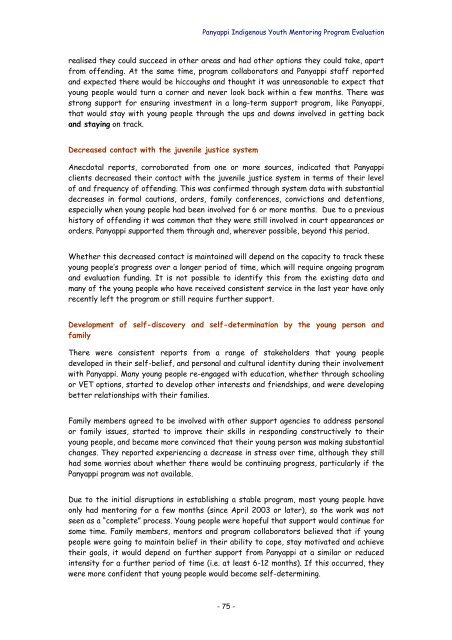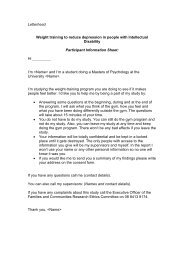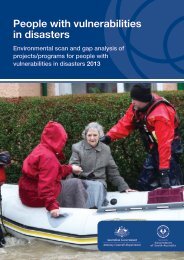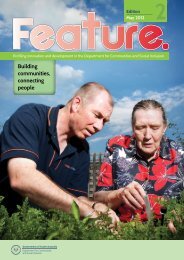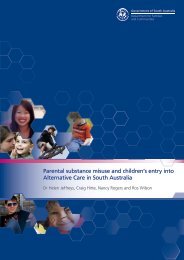Panyappi Indigenous Youth Mentoring Program Evaluation
Panyappi Indigenous Youth Mentoring Program Evaluation
Panyappi Indigenous Youth Mentoring Program Evaluation
You also want an ePaper? Increase the reach of your titles
YUMPU automatically turns print PDFs into web optimized ePapers that Google loves.
<strong>Panyappi</strong> <strong>Indigenous</strong> <strong>Youth</strong> <strong>Mentoring</strong> <strong>Program</strong> <strong>Evaluation</strong><br />
realised they could succeed in other areas and had other options they could take, apart<br />
from offending. At the same time, program collaborators and <strong>Panyappi</strong> staff reported<br />
and expected there would be hiccoughs and thought it was unreasonable to expect that<br />
young people would turn a corner and never look back within a few months. There was<br />
strong support for ensuring investment in a long-term support program, like <strong>Panyappi</strong>,<br />
that would stay with young people through the ups and downs involved in getting back<br />
and staying on track.<br />
Decreased contact with the juvenile justice system<br />
Anecdotal reports, corroborated from one or more sources, indicated that <strong>Panyappi</strong><br />
clients decreased their contact with the juvenile justice system in terms of their level<br />
of and frequency of offending. This was confirmed through system data with substantial<br />
decreases in formal cautions, orders, family conferences, convictions and detentions,<br />
especially when young people had been involved for 6 or more months. Due to a previous<br />
history of offending it was common that they were still involved in court appearances or<br />
orders. <strong>Panyappi</strong> supported them through and, wherever possible, beyond this period.<br />
Whether this decreased contact is maintained will depend on the capacity to track these<br />
young people’s progress over a longer period of time, which will require ongoing program<br />
and evaluation funding. It is not possible to identify this from the existing data and<br />
many of the young people who have received consistent service in the last year have only<br />
recently left the program or still require further support.<br />
Development of self-discovery and self-determination by the young person and<br />
family<br />
There were consistent reports from a range of stakeholders that young people<br />
developed in their self-belief, and personal and cultural identity during their involvement<br />
with <strong>Panyappi</strong>. Many young people re-engaged with education, whether through schooling<br />
or VET options, started to develop other interests and friendships, and were developing<br />
better relationships with their families.<br />
Family members agreed to be involved with other support agencies to address personal<br />
or family issues, started to improve their skills in responding constructively to their<br />
young people, and became more convinced that their young person was making substantial<br />
changes. They reported experiencing a decrease in stress over time, although they still<br />
had some worries about whether there would be continuing progress, particularly if the<br />
<strong>Panyappi</strong> program was not available.<br />
Due to the initial disruptions in establishing a stable program, most young people have<br />
only had mentoring for a few months (since April 2003 or later), so the work was not<br />
seen as a “complete” process. Young people were hopeful that support would continue for<br />
some time. Family members, mentors and program collaborators believed that if young<br />
people were going to maintain belief in their ability to cope, stay motivated and achieve<br />
their goals, it would depend on further support from <strong>Panyappi</strong> at a similar or reduced<br />
intensity for a further period of time (i.e. at least 6-12 months). If this occurred, they<br />
were more confident that young people would become self-determining.<br />
- 75 -


